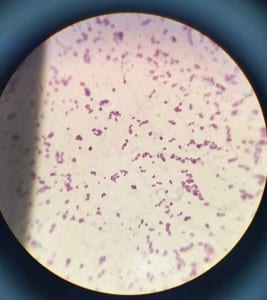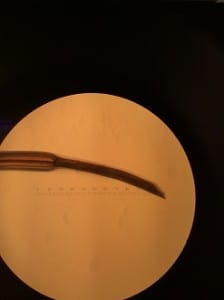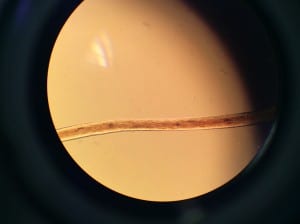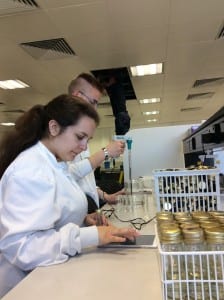I thought it would be easier to do a post summarising the first week, but it turns out we’ve packed quite a bit in to the week so prepare yourself for an essay! (Sorry… Although there are some pretty pictures to keep you going!)
Having not been in the labs for a few weeks I was excited to get going, and I have not been disappointed.
Monday morning started fairly slowly, but it was useful to see “behind the scenes” and the get hands on experience making up different agars which admittedly I had taken for granted previously – it is surprisingly difficult to hold a stack of agar plates and fill them up! It was also great to get some time on the microscopes and not feel pressured to be done with them quickly due to other people waiting to use them. I actually think I know what all the knobs do now and can confidently set one up and see more than my own eyelashes.
Tuesday involved filling in paperwork such as risk assessments and ethics forms – both took more consideration than I thought… Everything is a risk!
Wednesday I came in feeling excited as I knew we’d be practicing different techniques which I really want to get to grips with and be able to do in my sleep before the end of my summer project. But first we needed some samples to work from so my group went for a wander and piled in to a restroom armed with swabs and Ringers solution in my handbag.
We took two sets of swabs – one for rolling the swab directly on to the agar and one for making a serial dilution in hope of finding the best method to give us a workable number of bacteria (turns out we’re going with neither – membrane filtration is the way forward for us!). What is great about this experience is that it gives us the opportunity to learn from our mistakes. One lesson I’ve definitely learnt so far is that pipetting 1ml of solution on to an agar plate is far too much (10 times too much – whoops!). We dried the plates the best we could before incubating at 37 degrees overnight.
Thursday morning came around quickly and I was desperate to see how our first set of plates turned out considering our little mishap during preparation. Surprisingly our attempt at salvaging our plates (using the very technical way of shaking off excess to help them dry, as close to the Bunsen flame as possible!) actually worked and we did see some results:
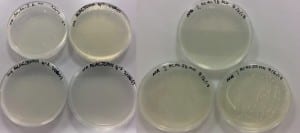
One thing I really wanted to learn to do well through this experience was streak plating so, using one of the samples from earlier I attempted it and again I left the lab excited to see the results the next morning.
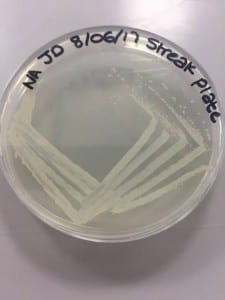
Friday morning success! I was happy with the results, but, ever keen to improve I tried again, this time on selective agars and I’m looking forward to seeing the fruits of my labour, similar I expect to how my mother felt waiting to see me perform in my first nativity play.
As we thought it would be best to make our agar fresh Monday morning, I gave Gram staining a go as I want to make the most of all the time we’ve been given. I will admit I let out an audible squeal of delight as the image came in to focus!
I’m also excited as Monday morning is the start of my groups finely tuned and tweaked project. We’ll be making agars and swabbing toilets to our hearts content and I for one, am very excited about what the week is going to bring!
